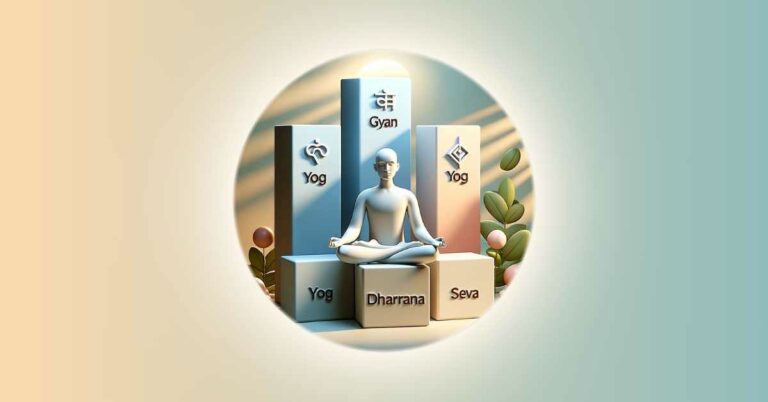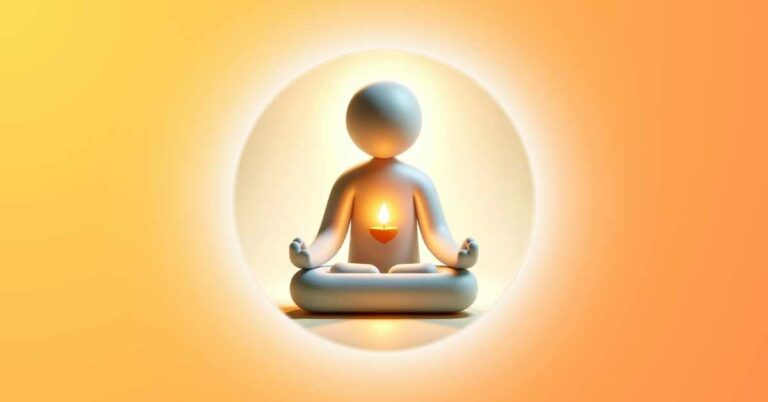Listen
Pause

A person standing confidently with their head held high and holding a glowing heart close to their chest, symbolizing self-worth.
Have you ever wondered why some people seem to command respect effortlessly, while others struggle to be taken seriously? The secret lies in how they value themselves. But what does valuing yourself really mean?
Growing up involves learning to see beyond surface behaviors. It’s about understanding the deeper motives behind actions—both others’ and our own. When we discern the true intent behind behaviors, we can respond more appropriately and avoid misjudgments.
When we look at someone’s actions, it’s essential not to judge based on the superficial. For instance, if someone speaks harshly, it’s easy to react to their tone. However, understanding the intention behind their words can help us respond with empathy rather than anger. This approach is equally vital when reflecting on our own actions and thoughts.
In spirituality, discernment means recognizing the underlying emotions and intentions behind actions. This ability to see deeper helps us make better decisions. For example, if we only react to someone’s angry words without understanding their frustration, our response might escalate the situation. But if we discern their underlying stress, we can address the root cause calmly.
We often use our discernment externally—judging situations and other people. However, true growth happens when we turn this power inward. Examining our own thoughts, attitudes, and belief systems allows us to understand and change them if necessary. This introspection leads to personal growth and better decision-making.
Respecting ourselves means treating ourselves kindly, even when others don’t. If someone insults us, reacting with anger means we’re letting their behavior control our emotions. Instead, maintaining our self-respect by staying calm and confident shows true strength.
Many of us have belief systems that dictate our reactions. For example, believing that we must get angry when disrespected only reinforces negative behavior. Instead, we can change this programming by deciding to stay composed and self-assured, regardless of others’ actions.
When faced with disrespect, our initial reaction is often emotional. We may feel hurt, angry, or defensive. These reactions, while natural, can harm us more than the disrespect itself. To value ourselves, we need to learn to pause and reflect before reacting. Ask yourself: “Is my response helpful or harmful?” This moment of reflection can make all the difference, allowing you to choose a response that maintains your dignity and peace.
Our thoughts shape our reality. If we constantly think, “I must get angry when disrespected,” we reinforce this negative behavior. Instead, practice changing these thoughts. Whenever you catch yourself thinking negatively, replace it with a positive thought like, “I choose to stay calm.” Over time, this shift in mindset will help you respond to disrespect in a way that values yourself.
It’s easy to get caught up in analyzing others’ actions. We might spend hours thinking about why someone behaved a certain way. However, this focus on others can distract us from our own growth. Instead, turn your focus inward. Ask yourself how you can maintain your peace and dignity, regardless of others’ actions. By focusing on yourself, you empower yourself to control your reactions and stay true to your values.
Self-love is about treating yourself with kindness and compassion. Acknowledge your worth, regardless of others’ opinions. When you love yourself, you set the standard for how others should treat you. Practicing self-love means speaking to yourself with kindness, taking care of your physical and emotional needs, and standing up for yourself when necessary. Remember, the way you treat yourself sets the tone for how others will treat you.
Valuing yourself is about recognizing your worth and maintaining your self-respect, even when others don’t. By discerning the true intentions behind actions and focusing on self-growth, you can navigate life with confidence and inner peace
(Turn on above audio and start practicing meditation)
Sit comfortably with your eyes half-open. Take a deep breath and let go of any tension. Imagine yourself surrounded by a warm, comforting light. This light represents your self-worth and inner strength. As you breathe in, feel this light filling you with confidence. As you breathe out, release any doubts or negative thoughts. Repeat to yourself, “I am worthy. I am strong. I respect myself.” Allow these affirmations to sink in, bringing you a sense of peace and empowerment.

Does God get angry and punish us, or are we the architects of our own destiny? This blog explores the deep-rooted beliefs about divine will and destiny, urging us to rethink our perspective on God’s role in our lives.

By embracing the wisdom of the lotus, engaging in positive thinking, and making meditation a daily practice, you embark on a journey of self-transformation. This journey is not just about personal growth; it’s a path to changing the world, one

Discover the profound wisdom of utilising life’s four treasures—Gyan, Yog, Dharna, and Seva—to amplify your happiness and blessings manifold. Learn how to transform these gifts into a source of endless joy and fulfillment in your life.

This blog emphasizes the importance of internal transformation in the New Year, advocating for a shift from external goals to fostering inner peace and empowerment. It underscores the power of not absorbing negativity, instead radiating positivity and using visualization techniques.

Discover simple practices to make positivity a natural part of your life. Learn about the power of discernment and how managing your thoughts can lead to lasting happiness

The choice between living in an era of strife (Kalyug) or peace (Satyug) lies within us. By adopting qualities of giving, forgiveness, and love, we can create a personal era of Satyug, irrespective of the external environment of Kalyug.
Start your day with a breeze of positivity and stay motivated with these daily affirmations
After Clicking on Join, You will be redirected to Whatsapp Community to receive daily message. Your identitiy will be secured and no group member will know about another group member who have joined.